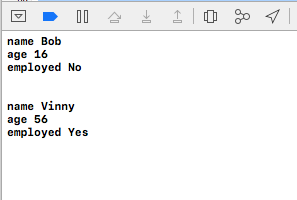I'm really struggling with trying to read a JSON file into Swift so I can play around with it. I've spent the best part of 2 days re-searching and trying different methods but no luck as of yet so I have signed up to StackOverFlow to see if anyone can point me in the right direction.....
My JSON file is called test.json and contains the following:
{
"person":[
{
"name": "Bob",
"age": "16",
"employed": "No"
},
{
"name": "Vinny",
"age": "56",
"employed": "Yes"
}
]
}
The file is stored in the documents directly and I access it using the following code:
let file = "test.json"
let dirs : String[] = NSSearchPathForDirectoriesInDomains(
NSSearchpathDirectory.DocumentDirectory,
NSSearchPathDomainMask.AllDomainMask,
true) as String[]
if (dirs != nil) {
let directories: String[] = dirs
let dir = directories[0]
let path = dir.stringByAppendingPathComponent(file)
}
var jsonData = NSData(contentsOfFile:path, options: nil, error: nil)
println("jsonData \(jsonData)" // This prints what looks to be JSON encoded data.
var jsonDict = NSJSONSerialization.JSONObjectWithData(jsonData, options: nil, error: nil) as? NSDictionary
println("jsonDict \(jsonDict)") - This prints nil.....
If anyone can just give me a push in the right direction on how I can de-serialize the JSON file and put it in an accessible Swift object I will be eternally grateful!
Kind Regards,
Krivvenz.


pathis visible only inifscope, and unresolved when you use it inNSData(contentsOfFile, options, error); you also have typos in enum names. – Hazlett